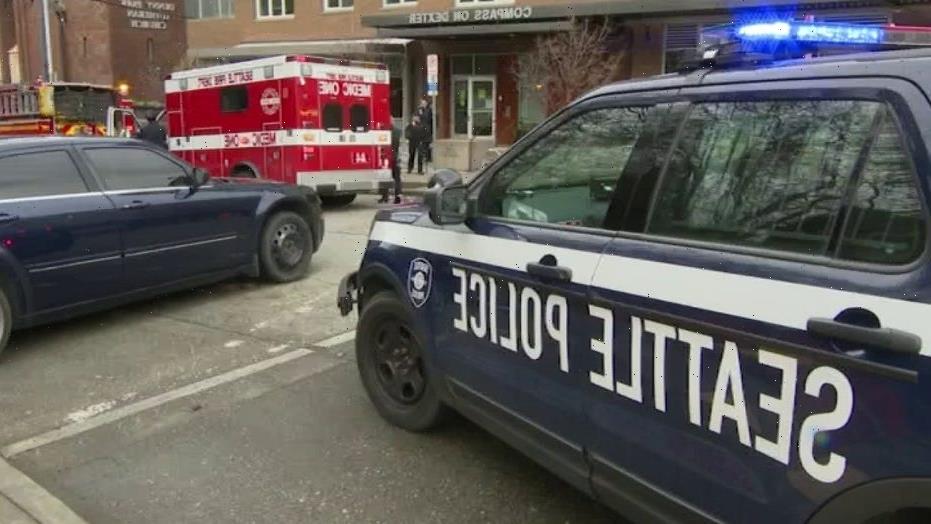Seattle officers not allowed to police homeless encampments: Jason Rantz
Seattle radio host and former deputy assistant to defense secretary Amber Smith discuss uptick in violence across major cities and the military’s ‘misplaced’ priorities
Voting in Seattle’s mayoral primary opens Tuesday, and voters living in the city plagued by the “CHOP” or “CHAZ” protest zone last summer must now decide among 15 candidates, including at least one city council member who supported cries to “defund the police.”
Primaries in Washington’s largest city are nonpartisan, and the two candidates who receive the most votes Tuesday will face off during the general election in November. The contest, happening more than a year after demonstrators seized a police precinct abandoned by officers last summer, highlights a political divide between activist-left voters and more moderate progressives.
In June 2020, protesters erected makeshift barricades around a six block radius in the Capitol Hill district, declaring no police were welcome in the space first dubbed the CHOP, or “Capitol Hill Organized Protest.” It was later rebranded by participants as the CHAZ, or the “Capitol Hill Autonomous Zone.”
Despite being formed under the guise of racial equity, crime permeated the autonomous zone, and residents who called 911 were reportedly told police wasn’t coming. More than three weeks would pass until several shootings in the zone, including one that killed a 19-year-old Black man, prompting Seattle Mayor Jenny Durkan to order city crews to dismantle barriers and disperse lingering protesters.
A year later, many residents are frustrated, with large swaths saying the city is on the wrong track. Six years after the city first declared homelessness an emergency, Seattle remains mired in a humanitarian crisis, with tent encampments and open air drug use a feature of many neighborhoods.
- Image 1 of 2
Pedestrians walk past the Seattle Police Dept. East Precinct headquarters, Saturday, July 31, 2021, in Seattle in an area that was occupied last year when demonstrators took over part of the city’s Capitol Hill neighborhood. (AP Photo/Ted S. Warren) (AP Photo/Ted S. Warren)
- Image 2 of 2
FILE – Seattle’s "CHOP" or "CHAZ" zone in July 2020. (Associated Press) (AP)
Meanwhile, as gun violence soars in Seattle and other major cities, there has been so much attrition at the Seattle Police Department that officers take several hours to respond to nonpriority calls.
The election comes weeks after Democratic primary voters in New York’s mayoral race chose a centrist former cop who balked at calls from the left to “defund the police.” Voters in overwhelmingly liberal Seattle must now also decide whether to back moderate candidates who reject pleas to reduce police budgets or candidates who support the agenda espoused forcefully by protesters last summer.
“These people need to get down to business and clean up the mess in this city,” Joe Howard, a Black 48-year-old financial trader who lives on Capitol Hill, told the Associated Press, decrying the “disorganized nonsense” of the protest zone. “I understand you want to open up society, you want a fair and equitable society, but just being airheaded about things behind a liberal ideology is not going to achieve that.”
Citing the need to focus on the city’s pandemic response, Durkan is not seeking a second term, and among those vying to replace her is City Council President M. Lorena González, who, along with other city council members, embraced activists’ calls to “defund” the police last summer in favor of unarmed responses to crisis calls and increased spending on services to avoid crime.
The council’s votes to reduce the police department by as much as 100 officers and to cut the command staff’s salaries backfired when Carmen Best, the city’s first Black police chief, who had deep support among minority communities, quit in protest.
More than 200 officers have left the department since.
“You had a majority of the council that embraced a significant policy move without much analysis or consideration,” Jon Scholes, president of the Downtown Seattle Association, told the Associated Press. “Now it’s had to retreat from it, but they did a lot of damage.”
Another mayoral candidate, Bruce Harrell, could also suffer from ties to city council, though less so because he retired in 2019 amid bleak reelection prospects — and before an unprecedented 2020.
Harrell grew up in Seattle’s Central Area, a redlined neighborhood; his father was a Black transplant from the Jim Crow South, and his mother’s family was Japanese and interned during World War II. An attorney, he served three terms on the city council, advocating for police accountability.
As for Gonzalez, her parents were migrant farmworkers in central Washington; she picked cherries as a child before becoming a lawyer and representing victims of police brutality. As council president she has helped pass a payroll tax on big corporations, such as Amazon, to pay for city services, as well as worker protections such as a secure-scheduling law. She has strong support among labor groups.
Other noteworthy candidates running for mayor include Colleen Echohawk, the recent executive director of Chief Seattle Club, a nonprofit that builds affordable urban housing for Native Americans; and Jessyn Farrell, a former state legislator who is a leading advocate for mass transit.
The Associated Press contributed to this report.
Source: Read Full Article

